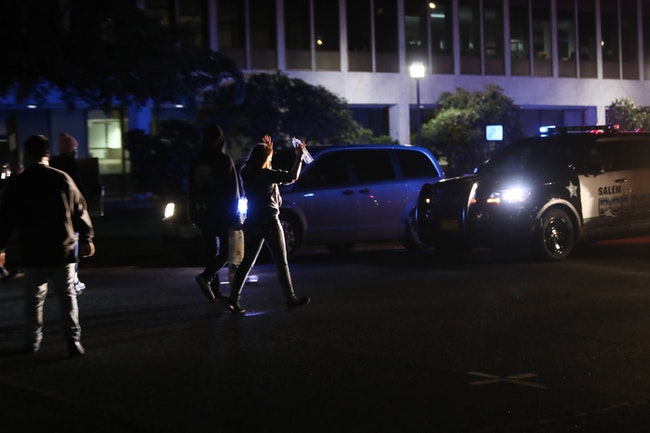A federal judge may set aside the most costly civil verdict against the city of Salem in recent history after ruling recently that a city police officer had no way of knowing he violated a woman’s rights when he shot her with rubber bullets at a protest three years ago.
The ruling on Friday, March 10, in effect found the officer is protected from the lawsuit because the protester suing him didn’t prove that other officers have historically been found liable for the same conduct.
The ruling comes six months after a jury unanimously found that Salem police officer Robert Johnston used excessive force against Eleaqia McCrae while trying to disrupt a downtown protest. She sued the city and Johnston in August 2020 in Eugene U.S. District Court.
Salem officials did not respond to multiple emails seeking clarification about the impacts of the ruling on the original verdict.
The jury found that Johnston violated McCrae’s Fourth Amendment right, awarding her $250,000 for economic loss and $800,000 in other damages.
The city has contested throughout that Johnson should not be held personally liable because there is no history of other court rulings which found similar use of force by officers was excessive.
That issue remained unresolved even after the jury verdict and the city continued to press its case.
Attorneys representing the city had argued before and after the trial that Johnston was entitled to qualified immunity. That legal principle is intended to shield government workers from personal liability when any “reasonable” person in their position wouldn’t know that their conduct was illegal.
Because those facts were disputed even after the trial, the judge needed to rule separately on the issue of qualified immunity.
Law enforcement officials across the U.S. have contended that qualified immunity gives officers some leeway in making split-second decisions such as using force, while critics have argued that such an approach has historically allowed police to avoid accountability for misconduct, according to the Congressional Research Service.
U.S. District Judge Karin Immergut ruled on Friday that Johnston did not target McCrae when he fired the rubber bullets and was following his training to disperse a crowd, which included demonstrators who had turned violent.
READ IT: Judge’s opinion and order
The judge could make a final judgment on the case soon, according to Courtney Knox Busch, the city’s strategic initiatives manager.
Knox Busch otherwise declined to comment on the ruling Monday as did Kevin Brague, the private attorney representing McCrae.
The lawsuit alleged that McCrae, a West Salem High School graduate and student athlete at Mt. Hood Community College, along with her sister and a friend attended a May 2020 protest in Salem after Minneapolis police officer Derek Chauvin murdered George Floyd.
Immergut recounted in her ruling what happened that night.
Around 9 p.m., McCrae and other demonstrators marched onto the Marion Street Bridge, then back into downtown Salem toward the Capitol before moving down Center Center Street back toward the bridges.
READ IT: McCrae’s civil complaint
Jason Van Meter, then a Salem police lieutenant and now chief of the Black Butte Ranch Police Department in Sisters, testified that police had to keep the Center Street Bridge clear because a delay in getting across the river to the downtown Salem hospital “would potentially cost somebody their life,” Immergut wrote.
Van Meter instructed 25 to 30 Salem police officers to form a line about a block from the bridge at the intersection of Center and Liberty Streets. He testified that as protesters approached the officers, an ambulance was trying to cross the Center Street Bridge, and the lieutenant declared the protest unlawful.
Van Meter also said he was considering that some officers had reported being charged by protesters who had something in their hands, reports of a disturbance on the Marion Street Bridge occupied earlier by the protesters and other emergency calls elsewhere in the city.
At 9:52 p.m. police announced the assembly had been declared unlawful and that demonstrators had to leave.
McCrae’s witnesses testified either that they did not hear the orders or it was hard to ascertain what were the orders.
Her lawsuit described the march as involving no rioting, looting or destruction of property at the time that Salem police intervened. She also alleged that protesters near the front of the march couldn’t leave because they were blocked by police in front and other marchers behind them.
But Immergut found that the orders for demonstrators to leave can be heard “clearly and loudly” in videos of the incident, adding that “the crowd had several places to which they could retreat and were not impeded in any way from turning around and walking away.”
Witnesses for the city and Johnston testified that demonstrators threw bottles filled with frozen liquid or nails, rocks, eggs, fireworks and mortars at officers.
Other witnesses said that while eggs and water bottles had been thrown, “there was no other violence among the crowd,” Immergut said.
“While there is no evidence that (McCrae) was violent, some of the protesters engaged in violent behavior,” Immergut wrote. “The crowd had previously occupied the Marion Street Bridge, was marching in the direction of the Center Street Bridge, had been ordered to disperse, and was refusing to do so, creating a significant risk to public safety.”
Around six minutes after police ordered demonstrators to leave, Van Meter instructed officers to use CS gas on the crowd.
When Johnston tossed a gas canister toward the crowd, one demonstrator threw the smoking canister back at police. Johnston testified that he fired a round of rubber bullets to protect officers.
McCrae said in her lawsuit that when she turned to leave the scene, Johnston shot her twice, hitting her in the eye.
In the city’s response to the lawsuit, attorneys said McCrae’s injuries, “if any,” were caused by “by failing to disperse the area when the protests were no longer peaceful.”
READ IT: City’s answer to complaint
After the September verdict against Johnston, the Department of Public Safety Standards and Training, the state agency tasked with licensing officers, opened its own investigation of Johnston over the allegations in the lawsuit. The investigation subsequently was suspended to await the judge’s ruling over whether Johnston violated legal or constitutional rights.
The state investigation remains on hold.
“The case manager only received the information about the court case today and she will need time to confer with management about the process moving forward,” according to Rebecca Hannon, a records specialist for DPSST.
Johnston retired from the Salem Police Department in June 2022 after nearly 18 years. He also worked as a part-time instructor at the state’s police academy for three years. He resigned that role on Nov. 4, one day after the state agency opened its investigation, according to DPSST records.
PREVIOUS COVERAGE
State pauses investigation of Salem officer pending court ruling on qualified immunity
Jury awards $1 million to protester injured by Salem police
Contact reporter Ardeshir Tabrizian: [email protected] or 503-929-3053.
JUST THE FACTS, FOR SALEM – We report on your community with care and depth, fairness and accuracy. Get local news that matters to you. Subscribe to Salem Reporter. Click I want to subscribe!

Ardeshir Tabrizian has covered criminal justice and housing for Salem Reporter since September 2021. As an Oregon native, his award-winning watchdog journalism has traversed the state. He has done reporting for The Oregonian, Eugene Weekly and Malheur Enterprise.










